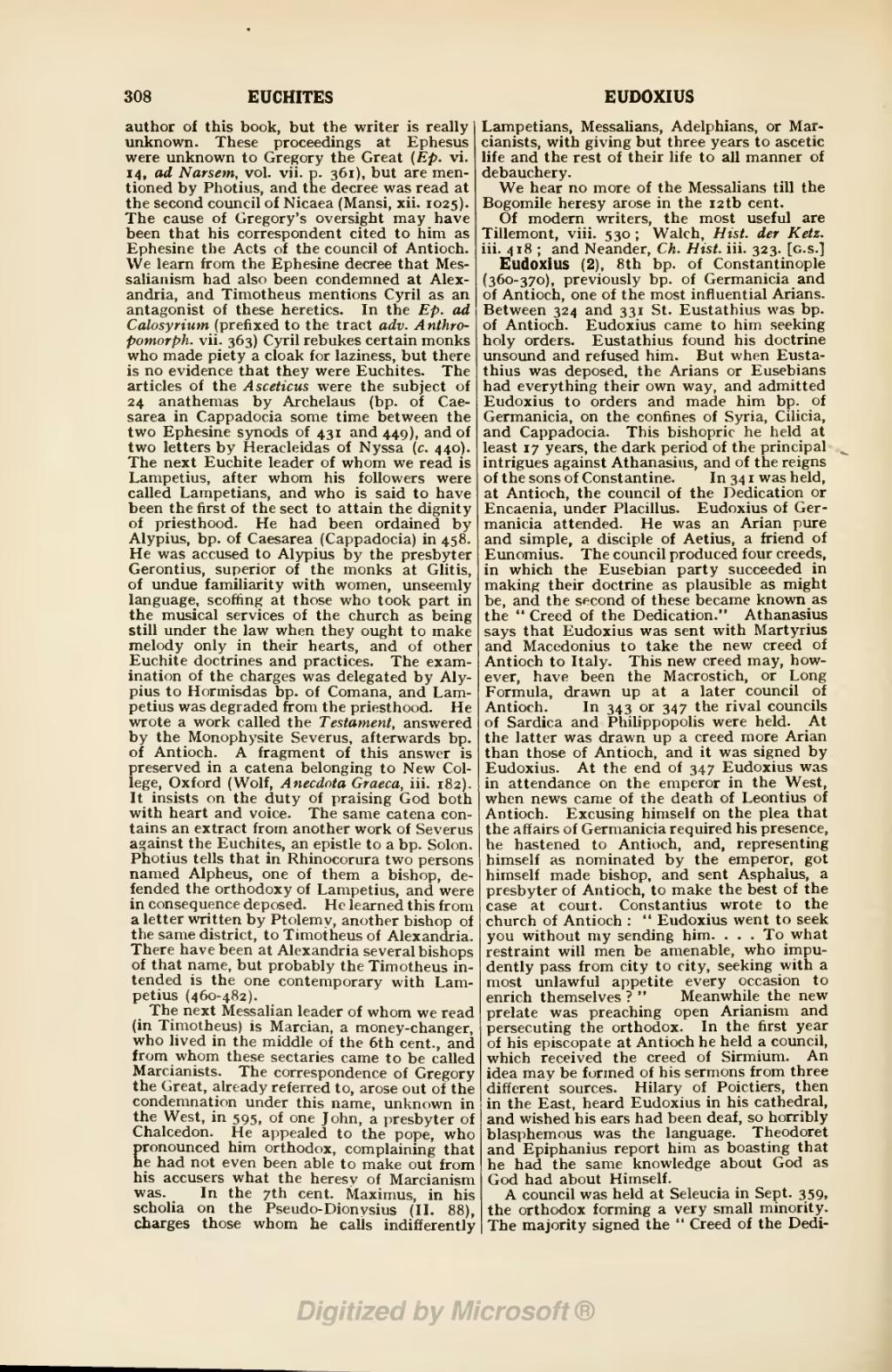author of this book, but the writer is really unknown. These proceedings at Ephesus were unknown to Gregory the Great (Ep. vi. 14, ad Narsem, vol. vii. p. 361), but are mentioned by Photius, and the decree was read at the second council of Nicaea (Mansi, xii. 1025). The cause of Gregory's oversight may have been that his correspondent cited to him as Ephesine the Acts of the council of Antioch. We learn from the Ephesine decree that Messalianism had also been condemned at Alexandria, and Timotheus mentions Cyril as an antagonist of these heretics. In the Ep. ad Calosyrium (prefixed to the tract adv. Anthropomorph. vii. 363) Cyril rebukes certain monks who made piety a cloak for laziness, but there is no evidence that they were Euchites. The articles of the Asceticus were the subject of 24 anathemas by Archelaus (bp. of Caesarea in Cappadocia some time between the two Ephesine synods of 431 and 449), and of two letters by Heracleidas of Nyssa (c. 440). The next Euchite leader of whom we read is Lampetius, after whom his followers were called Lampetians, and who is said to have been the first of the sect to attain the dignity of priesthood. He had been ordained by Alypius, bp. of Caesarea (Cappadocia) in 458. He was accused to Alypius by the presbyter Gerontius, superior of the monks at Glitis, of undue familiarity with women, unseemly language, scoffing at those who took part in the musical services of the church as being still under the law when they ought to make melody only in their hearts, and of other Euchite doctrines and practices. The examination of the charges was delegated by Alypius to Hormisdas bp. of Comana, and Lampetius was degraded from the priesthood. He wrote a work called the Testament, answered by the Monophysite Severus, afterwards bp. of Antioch. A fragment of this answer is preserved in a catena belonging to New College, Oxford (Wolf, Anecdota Graeca, iii. 182). It insists on the duty of praising God both with heart and voice. The same catena contains an extract from another work of Severus against the Euchites, an epistle to a bp. Solon. Photius tells that in Rhinocorura two persons named Alpheus, one of them a bishop, defended the orthodoxy of Lampetius, and were in consequence deposed. He learned this from a letter written by Ptolemy, another bishop of the same district, to Timotheus of Alexandria. There have been at Alexandria several bishops of that name, but probably the Timotheus intended is the one contemporary with Lampetius (460-482).
The next Messalian leader of whom we read (in Timotheus) is Marcian, a money-changer, who lived in the middle of the 6th cent., and from whom these sectaries came to be called Marcianists. The correspondence of Gregory the Great, already referred to, arose out of the condemnation under this name, unknown in the West, in 595, of one John, a presbyter of Chalcedon. He appealed to the pope, who pronounced him orthodox, complaining that he had not even been able to make out from his accusers what the heresy of Marcianism was. In the 7th cent. Maximus, in his scholia on the Pseudo-Dionysius (II. 88), charges those whom he calls indifferently Lampetians, Messalians, Adelphians, or Marcianists, with giving but three years to ascetic life and the rest of their life to all manner of debauchery.
We hear no more of the Messalians till the Bogomile heresy arose in the 12th cent.
Of modern writers, the most useful are Tillemont, viii. 530; Walch, Hist. der Ketz. iii. 418; and Neander, Ch. Hist. iii. 323.
[G.S.]
Eudoxius (2), 8th bp. of Constantinople (360-370), previously bp. of Germanicia and of Antioch, one of the most influential Arians. Between 324 and 331 St. Eustathius was bp. of Antioch. Eudoxius came to him seeking holy orders. Eustathius found his doctrine unsound and refused him. But when Eustathius was deposed, the Arians or Eusebians had everything their own way, and admitted Eudoxius to orders and made him bp. of Germanicia, on the confines of Syria, Cilicia, and Cappadocia. This bishopric he held at least 17 years, the dark period of the principal intrigues against Athanasius, and of the reigns of the sons of Constantine. In 341 was held, at Antioch, the council of the Dedication or Encaenia, under Placillus. Eudoxius of Germanicia attended. He was an Arian pure and simple, a disciple of Aetius, a friend of Eunomius. The council produced four creeds, in which the Eusebian party succeeded in making their doctrine as plausible as might be, and the second of these became known as the "Creed of the Dedi-
